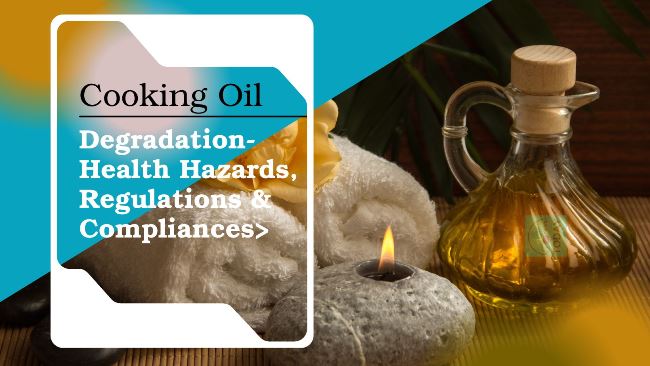Used Cooking Oil: Signs, Health Risks, and Compliance Essentials
Signs of Used Cooking Oil: Degradation - Health Hazards, Regulations & Compliances

Many people don’t know what happens to used cooking oil after they dispose of it in the trash, and they definitely don’t know the health hazards that come with it.
When used cooking oil is burned or exposed to high heat, it produces harmful chemicals such as aldehydes, which are associated with cardiac infarction and hypertension, as well as ketones and fatty acids, which can contribute to conditions like atherosclerosis, Alzheimer’s disease, and liver disorders.
What Happens Due To Re-Use of Cooking Oil?
Did you know what happens to used cooking oil? It’s more than just a sticky residue—it’s a growing concern. Used cooking oil often lingers on non-stick pans, baking sheets, and even in the crevices of ovens. Worse, it can leach into food during cooking, posing significant health risks.
Many are unaware of the dangers associated with degraded cooking oil. Here are some serious health hazards to watch out for: cardiac infarction, hypertension, atherosclerosis, Alzheimer’s disease, and liver damage.
Signs of degradation of cooking oil:
- Significant deficiencies in smell or taste
- Blue-gray smoke at 180 degree C
- Resistant tough foam when adding fried food
- Dark, murky appearance
- Consistency changes
- Substantial proportions of charred residues on the surface
- Excessive formation of hydrocarbons and peroxides on the surface
What happens when we Cook with re-used cooking Oil?
When we cook with used cooking oil, we subject ourselves to toxins. It’s all in the bottom-line. There are a wide range of health hazards: Cardiac infarction, Hypertension, Atherosclerosis, Alzheimer’s disease and liver disease.
Moreover, when cooking with used cooking oil and it has been heated to an extreme temperature (i.e., over 375°F), trans-fats are created that can clog up arteries and veins.
These diseases are majority caused by the too often re-used of cooking oil and the re-entry of used cooking oil (UCO) onto the food chain.
Signs of Devaluing Used Cooking oil
Used cooking oil has health hazards that should be taken seriously, especially if it’s on sale. Signs of degradation include having an unpleasant odor and tasting bitter or metallic.
The biggest question is how do you dispose of cooking oil environmentally? Re-purpose your old cooking oil into new, usable items like soap. Products like Granny’s Lye can take care of all the residual debris from cooking grease as well. Use what you have!
How Can We Protect Ourselves from Re-used Cooking Oil?
If you’re not sure if your cooking oil is still safe, there are a few ways to determine if it has degraded. Watch out for any changes in color, odor or viscosity as these could be indicators that the oil has been contaminated. In order to safeguard our health, the total polar compounds (TPC) are around 25%.
How To Store Your re-used cooking oil properly?
In order to safeguard our health, the total polar compounds (TPC) are around 25%. There are some tips for storing used cooking oil: keep it in a dark and cool place, avoid exposure to light, don’t heat it up or put in boiling water and use only after the specified time. Keeping the right temperature is crucial for used cooking oil as there will be an increased risk for rancidity which causes deterioration in quality and produces toxic substances.
Used Cooking oil Regulations and Compliances in the World
World Regulations and Standards for cooking oil:
China specifies that used cooking oil must have the TPC content lower than 1000ppm, 10-350 ppm are applied in most places. The USA specifies it should be below 400ppm. In Germany, France, Italy and other European countries, the standard is set at 200ppm. South Korea sets it at 100ppm or less. India mandates that used cooking oil cannot exceed 600ppm.
We must stop poisoning ourselves:
No re-entering the food chain!
In order to safeguard our health, the international limit for Total Polar Compounds (TPC) is around 25%. Beyond this limit, cooking oil is deemed unsafe for human consumption and must be discarded in a manner then what to do?
Re-use of cooking oil should be avoided
In case of reheating of oil, use maximum three times of avoid the formation of Trans fat. It’s ideal to use once if possible.
Re-heating and re-use of oil should be avoided as far as possible, avoid using leftover oil whenever possible.
No food business operator, directly or through any representative, shall manufacture, store, sell, or distribute any food item deemed unsafe
Any person whether by himself or by any other person on his behalf, manufactures for sale or stores or sells or distributes any article of food for human consumptions which is unsafe is unsafe shall be punishable with imprisonment for term which may extend to six months and also with fine which may extend to one lakh BDT.
What type of Health Hazards Faces by Human for Used Cooking oil?
Used cooking oil has a variety of health hazards that it can cause. There are Cardiac infarction, Hypertension, Atherosclerosis, Alzheimer’s disease and liver disease. These problems range from mild ailments to very severe. In order to prevent these diseases you need to be conscious of the type and amount used cooking oil used as well as its deterioration. For example when the TPC levels reach 25% it is considered degraded used cooking oil so use caution.
Why Shouldn’t I Reuse My Spent Cooking Oils If they’re still good?
All cooking oils, even used ones, have a use by date. Your cooking oil may seem fine now but if it’s degraded from frying meat or other non-vegetable items, its healthy properties are diminished and contain high levels of the toxic substance known as triacylglycerol’s (TGs). Cooking oil that has been used multiple times over a long period is called spent cooking oil.
FAQs
Q: Can I sell old cooking oil?
Selling old cooking oil for recycling is a way for some states and countries to make money out of waste that might otherwise end up in landfills. So the bottom line is, if you don’t want it, give it away or sell it. Used cooking oil compliances are required by law so there will be no problems with selling old cooking oil as long as you know your state and country compliances.
Q: How much used cooking oil prices?
Most people are not aware that used cooking oil becomes a commodity that is bought and sold. Factors such as use-by date, load size, fat content, protein content and packaging material all have an impact on the price. Used cooking oil price ranges from $5-30 per 20 liters with heavier oils costing more due to the energy it takes to transport them. The longer the oil is allowed to remain in use, the lower its quality and value as a commodity will be.
Q: How do you Dispose of Cooking oil environmentally?
Many consumers believe that pouring used cooking oil down the sink will not cause any environmental problems. However, this is an incorrect way to dispose of cooking oil. When cooking oil goes down the drain, it can create serious health hazards.
Q: How do you know if cooking oil is bad?
Used cooking oil specification would include the amount of polar compounds (TPC) that is 25%. There are a number of other signs that can be followed when evaluating if used cooking oil is bad and should be discarded.
Q: What happens when cooking oil goes rancid?
When cooking oil goes rancid, it can have a range of bad effects on your health. One such effect is cardiac infarction, which can lead to other major problems like Hypertension, Atherosclerosis, Alzheimer’s disease and liver disease.
Q: How long will used cooking oil last?
The lifespan of used cooking oil depends on its temperature during use. For example, used cooking oil will last longer at a lower temperature.
Q: How many times cooking oil can be reused?
At least three times cooking oil can be used. However, if used cooking oil is not properly reused, it will eventually show signs of degradation. When this happens, the health hazards are problems like Cardiac infarction, Hypertension, Atherosclerosis, Alzheimer’s disease and liver disease.
Q: How can I test the quality of my oil at home?
Did you know that you can test the quality of your oil at home? It’s easy, just put a few drops in some water and put it on the stove. If there is no bubbling or burning, your oil is high quality.
Q: Can I reuse oil after frying?
Yes. Generally, it is not advisable to reuse oil, as you don’t know the degradation level. If you still want to reuse your oil after frying, there are a few things you can do.
Q: What is cooking oil degradation temperature?
You should store your used cooking oil in an airtight container in a refrigerator. This can lower the temperature, but it is better than leaving it out in the open which could cause the oil to degrade faster.
Q: Who can sell old cooking oil?
Selling old cooking oil for recycling is a way for some states and countries to make money out of waste that might otherwise end up in landfills. So the bottom line is, if you don’t want it, give it away or sell it. Used cooking oil compliances are required by law so there will be no problems with selling old cooking oil as long as you know your state and country compliances
Q: Do people buy used oil?
Yes, Used-oil collectors may buy waste oil from car-repair shops and auto-parts stores so that it can be re-refined into a fresh supply of lubricants
The purchasing and selling of used cooking oil is a huge industry, which is why we know what can happen when it is not stored properly. It has been shown that in certain instances the total polar compounds (TPC) are around 25%.
This percentage can be even higher if it’s not handled with care or isn’t stored at the right temperature. Furthermore, cooking oil degradation usually starts as soon as you put your frying pan on the stove and use it for the first time.
Q: Why don’t dispose of cooking oil environmentally?
Cooking oil and fat shouldn’t be poured down sinks as it can cause blockages. If you do not have access to a food waste recycling service, put it in a sealed container and place in the general waste bin.
Who collects cooking oil?
Bio Energy Ltd
Bio Energy Ltd collects used cooking oil in Bangladesh and producer of bio diesel. Bio Energy Ltd is a one stop solution for all your used cooking oil management.
Cater Oils
Cater Oils collects waste cooking oils in London, offering a FREE weekly, fortnightly or Monthly collection. They operate inside the M25, North and South Circular as well as the congestion charging & ULEZ.
Muenzer Bangla Private Ltd
Muenzer Bangla Ltd also analyzed fresh edible oil and Used Cooking Oil (UCO) from a wide range of sources in Bangladesh according to international standards.
Finally,
The biggest signs of used cooking oil degradation are the total polar compounds and the resultant problems on our health. As you can see, there are many signs of degradation for used cooking oil. The health hazards that have been highlighted are just some examples, but as seen from the given facts, there are several health risks you should be aware of. For these reasons it is necessary to use high quality cooking oils.




